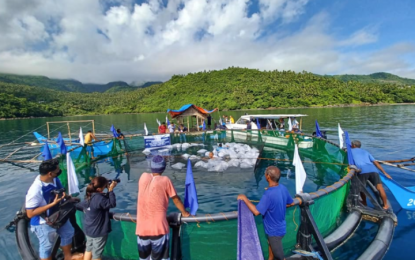
Sagñay Mariculture Park and Tilapia Fingerlings at Sagñay River in Camarines Sur (Photo courtesy of BFAR)
MANILA – AGRI Party-list Rep. Wilbert Lee has filed a bill seeking to establish a National Mariculture Program (NMP) to boost the country’s food security.
“Our country is one of the world's top producers of fish and aquatic plants. Given our distinct advantage in natural resources, we must exert greater effort to ensuring that we can utilize these resources amid the dangers of the climate crisis and increasing food insecurity,” Lee said in a statement on Wednesday.
“Through mariculture, we could provide a renewable and scalable source of food for Filipino families, as well as livelihood for those living in fishing communities,” he added.
Mariculture refers to the farming of aquatic plants and animals through sea cages, long lines and other culture structures in marine and coastal areas. High value species, such as bangus, siganid, seaweeds, oysters, mussels, red snappers, groupers, among others, can be grown through this method.
House Bill No. 5531, or the National Mariculture Program bill filed on Tuesday, pushes for the legislated establishment of the NMP, which is a current program being implemented at scale by the Bureau of Fisheries and Aquatic Resources (BFAR).
“Through this bill, the program shall be expanded throughout the Philippines in areas that are identified as conducive for mariculture,” Lee said.
If passed, the government would be mandated to adopt the ecosystem-based approach to fisheries management to ensure that the marine environment remains conducive to sustainable fisheries, species management and mariculture investment.
The government would also be tasked with minimizing the adverse effects of mariculture in view of the multiple uses of marine and coastal areas.
The government would also be required to improve the viability of mariculture by developing the technical skills of fishermen throughout the production, harvesting, processing, storage, and transport stages in the value chain; providing appropriate infrastructure and equipment for post-harvest technology; and ensuring easy access to finance.
Local government units shall supervise the establishment of mariculture parks and zones in duly designated areas located municipal waters.
Mariculture parks are areas in the sea that are similar to industrial parks or estates on land where the appropriate infrastructure such as roads, other facilities, and support services are provided to attract entrepreneurs/investors.
In mariculture parks, the infrastructure provided are a mooring (anchoring) system for floating fish cages, fish landings, and cold storage, among others; and support services for processing, transport, and marketing.
In pushing for the bill's passage, Lee emphasized the need for government to continue looking for ways to expand its food production capabilities in the face of its increasing vulnerability to climate change.
“We are among the most vulnerable countries in the world. Thus, our food security is at serious risk. Kung hindi natin paiigtingin ang paghahanap ng mga solusyon para mapabuti ang ating food production, mananaig ang kagutuman sa bansa (If we do not intensify our efforts in looking for solutions to improve our food production, hunger will prevail in our country),” Lee said.
“Magandang solusyon ang mariculture sa layuning ito. Kung madi-develop nang maayos, winner tayo lahat (Mariculture is a good solution towards this goal. If properly developed, all of us will be winners),” he added. (PNA)
